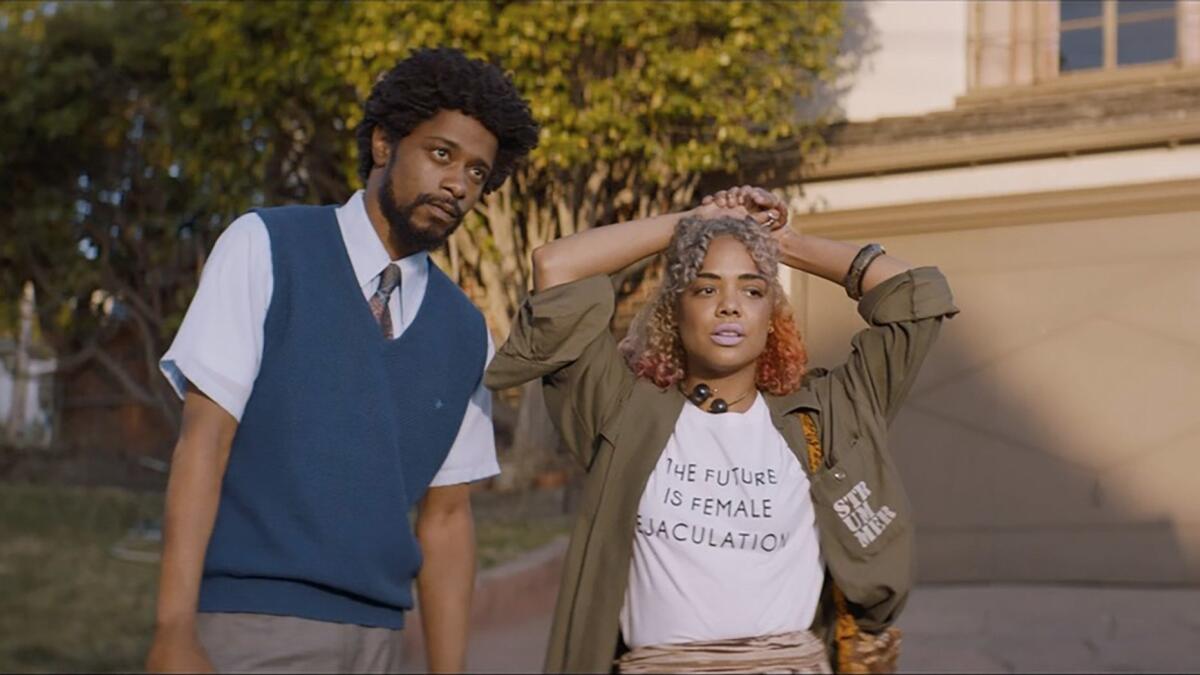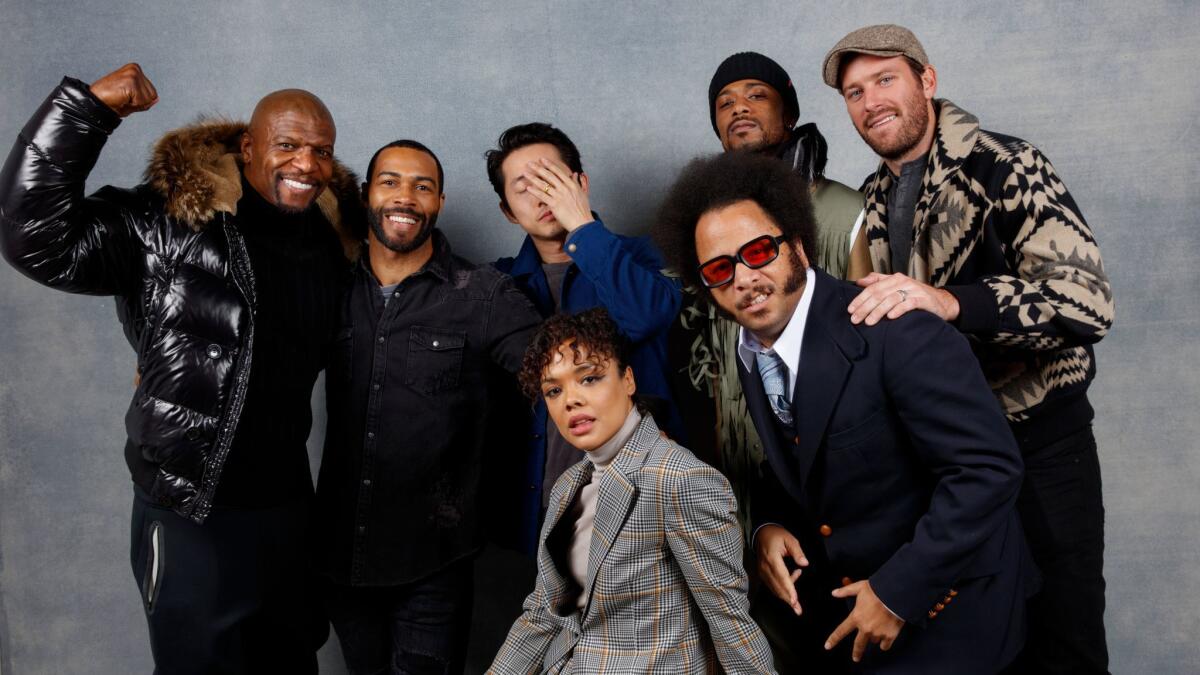Boots Riley stays true to his own voice with the Sundance premiere ‘Sorry to Bother You’
Boots Riley isn’t into biting his tongue. As the frontman of the socially conscious hip-hop group the Coup since 1991, with witty, searing criticism of sociopolitical issues weaved into his lyrics, he never does. But as a member of the rap rock supergroup Street Sweeper Social Club, which was formed in 2006 along with guitarist Tom Morello of Rage Against the Machine, he was forced to collaborate. Although he doesn’t regret the experience, he admits that following that venture, which ended in 2010, he “wasn’t as excited about making music.”
“I think that I got …, not uninspired, but I didn’t feel as connected to it,” he said, “because with the Coup, it’s all my vision. For being someone who talks about social change and stuff, it’s hard to collaborate with people [and their] ideas and stuff, and I think I came away from [Street Sweeper Social Club] being like, ‘I want to just create my own world. I want to tell that story.’”
The eventual result was a transition into filmmaking. Over a period that ultimately spanned seven years, Riley wrote and directed his first feature, “Sorry to Bother You,” which will be given its premiere in the U.S. dramatic competition at the Sundance Film Festival on Saturday.

“Sorry to Bother You” follows Cassius Green (festival favorite Lakeith Stanfield of “Get Out” and “Crown Heights”), a young black telemarketer in Oakland who discovers a unique selling power living inside of him. That power catapults him up the the ranks to the elite team inside his company, which he discovers sells heinous products and services.
Cassius’ success raises concerns for his girlfriend, Detroit (the always mesmerizing Tessa Thompson), a sign-twirling gallery artist who is secretly a part of a Banksy-style collective. But the unimaginable happens when Cassius meets the company’s cocaine-snorting, orgy-hosting chief executive, Steve Lift (“Call Me by Your Name’s” Armie Hammer), in this alternative universe that is not unlike our own.
The magically realistic dark comedy and political satire, which also counts Steven Yeun, Jermaine Fowler, Omari Hardwick and Terry Crews among its ensemble, is an intellectual rumination on capitalism, activist culture and success. It stands, quite refreshingly, as a narrative response to the rise of the Black Lives Matter movement, the corporatization of wealth and what can happen when one loses sight of himself.
Riley had the idea for the script in 2011.
“A lot of times when I’m writing songs, I have scenes in my head that I’m translating into poetry,” the Oakland native said, noting that “it just felt like one less layer and the script just poured out of me.”
The process also marked a return, of sorts, to a teenage interest in making films that began with theater and led to Riley studying film at San Francisco State. Luckily, storytelling has stuck with him through more than 25 years of making music, so branching out wasn’t too foreign an experience.
The original plan, Riley said, was to “write a movie that we can do with $50,000. It’s gonna happen in one place that we get for free from somebody and we’ll shoot it in a week there, or something like that. And it’s gonna be a workplace comedy with some of my ideas in it.”
But as he wrote, he realized that creating under such parameters was limiting his abilities.
I’m not good at sounding like somebody else or doing what someone else does.
— Boots Riley
“We have weird songs like ‘Ass-Breath Killers’ which is about these magical pills you take that stop you from kissing the boss’ ass or like a song to my daughter called ‘Wear Clean Draws,’ so I realized a long time ago with writing songs, it has to be an angle that makes me feel like I’m giving you something that you don’t have already,” he said. “I’m not good at sounding like somebody else or doing what someone else does, because then I’m studying what you do and trying to do it after you do it, and it’s not good.”
So he wrote the first scene of the movie and took the journey along with his characters to the film’s end.
“I think that not having any walls or limitations … I realize that that’s how I’ll always create,” he said. “I can’t think about whether it works or not until afterwards.”
But he never believed the film would get made. He just hoped it would reinspire him to make music. It did, with the Coup developing two albums, one of which — titled “Sorry to Bother You” — was released in 2012. (The other will be released as the picture’s soundtrack. The Coup also did all the diegetic music for the film while musical group Tune-Yards did the film’s score.)
A couple of years later, the script picked up traction after being published in McSweeney’s quarterly, prompting Riley to look into directors.
“At one point, I hit up Richard Ayoade and he was like, ‘I can’t do this,’” Riley recalls. “He was like, ‘You need to do this.’ I was like, ‘Nobody’s gonna let me direct it.’ And he was like, ‘You’re the only one that can do this. Anybody else is gonna … it up.’
“And he convinced me to go ahead and just go for it.”
That’s when Riley began meeting people like Charles D. King through Sundance labs. King, whose Macro is responsible for producing films like “Fences” and “Mudbound,” said he was instantly “fascinated by [Riley] and the project when he pitched.”
“I was really intrigued after reading the screenplay,” noting that as he continued to stay in contact, Riley refined his voice. At one point, King said, “It was that project that just created a lot of excitement and there was so much conversation.”
“It was bold and audacious, kind of like Boots,” King said, prompting Macro to come aboard as partners along with Nina Yang Bongiovi and Forest Whitaker’s Significant Productions, among others.

When it came to casting the project’s leads, Riley was very intentional, he said. He told the male actors there was a full-frontal nudity scene that was not negotiable.
“I’ve been waiting for a scene with full-frontal nudity,” Riley remembered Stanfield, who had not yet blown up for his roles in film and FX’s “Atlanta,” saying at their first meeting. “He really was about the process and was open.” (That scene was cut from the final film.)
As for Thompson, whom Riley has long been a fan of, he originally didn’t consider her for the role, assuming she was too busy. But when there came a stalemate between him and producers about who the female lead should be, Riley put his foot down.
“I said something like, ‘OK, I want this person unless we can get Tessa Thompson to audition,’ thinking that we can’t get her to audition or to do a chemistry read,” he said. “And then she was like, ‘OK. Cool. What do you want me to do?’”
Riley hopped on a three-way Skype call with Thompson and Stanfield “and it was just fire!”
“I remember that the Skype connection was tricky,” Thompson said, “and it was slightly awkward since I hadn’t met Boots yet, but still, somehow, it felt like we had known each other for quite some time. I had to look at the screen to see Lakeith and, in doing so, could also see Boots react to us. I remember his focus. Every inch of him seemed to be really leaning in to listen. Since he was a musician entering this new space, I remember thinking that this kind of concentration would be essential throughout the journey of making this film.”
That concentration, paired with his unique personality, Oakland swag and activist roots, Thompson said, makes Riley “one of those artists who cannot separate the desire to reflect the world in which he lives from his work.”
“This seamless approach to storytelling, while creating an essential cultural conversation, makes him a really upfront collaborator,” she continued. “He doesn’t mince words. It’s refreshing to have someone be so incredibly candid. It’s disarming and, oddly, makes you feel safe because you know he’ll tell you the truth.”
Get your life! Follow me on Twitter (@TrevellAnderson) or email me: [email protected].
More to Read
Only good movies
Get the Indie Focus newsletter, Mark Olsen's weekly guide to the world of cinema.
You may occasionally receive promotional content from the Los Angeles Times.










